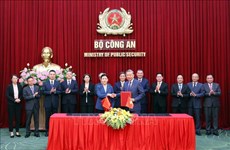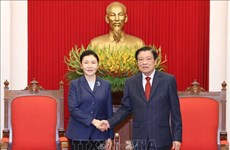East Sea tension affects regional security, say scholars
The escalating tension in the East Sea, a key navigation route as well
as a site believed to habour vast deposits of oil, did and will have
considerable implications for regional security, foreign scholars said
at a round-table workshop in Singapore on May 28.
The escalating tension in the East Sea, a key navigation route as well
as a site believed to habour vast deposits of oil, did and will have
considerable implications for regional security, foreign scholars said
at a round-table workshop in Singapore on May 28.
Discussions at the workshop focused on issues related to the current situation in the East Sea, including legal foundations for parties concerned to claim sovereignty, Indonesia’s role as a voice of moderation and mediation in the troubled waters, China’s sea strategy and the United States’ strategy of pivot to Asia.
Increased interests in the East Sea by countries beyond the region, such as India, the Republic of Korea, Australia and New Zealand, and possible scenarios for the East Sea situation were also put on the table.
Most speakers expressed concern about China’s increasingly assertive acts in territorial dispute with its neighbouring countries. They stressed that ASEAN and China should quickly reach a Code of Conduct in the East Sea as soon as possible, as peace, stability and freedom of trade and navigation in the East Sea are the interest of not only ASEAN but also other countries in the world.
Talking with Vietnam News Agency correspondents, Dr. Leszek Buszynski from the Australia National University’s National Security College said there is very little legal basis for China’s nine-dash line in the East Sea, and the Chinese themselves have great difficulty trying to justify it.
Meanwhile, Prof. Dr K.S. Nathan from the National University of Malaysia held that if force is being used to intimidate any of the other claimants, it will invite counterforce. “That’s why we see that other external partners are also getting more and more interested in the East Sea dispute because they are interested in the safety of sea lines of communication, the free flow of commerce, free flow of trade on which the prosperity of Southeast Asia and Asia has depended for a long time,” he said.
Many speakers said besides other challenges such as pirate, terrorism and human trafficking, water territorial disputes are posing the greatest obstacle to efforts to create a good order in ASEAN region. Therefore, Mira Permatasari, a staff of the Office of Private Secretary to Indonesia President said a greater role of ASEAN as a key driver is needed to solve the dispute.
At the beginning of May, China illegally dispatched the Haiyang Shiyou-981 rig, as well as a large fleet of armed vessels, military ships and aircraft, to Vietnam’s waters and positioned the rig at 15 degrees 29 minutes 58 seconds north latitude and 111 degrees 12 minutes 06 seconds east longitude. The location is 80 miles deep inside Vietnam’s continental shelf and exclusive economic zone.
On May 27, China moved the rig to 15 degrees 33 minutes 22 seconds north latitude and 111 degrees 34 minutes 36 seconds east longitude. The new location is 25 nautical miles from Tri Ton Island in Vietnam’s Hoang Sa archipelago and 23 nautical miles east-northeast from the old location, still completely within Vietnam’s continental shelf. With the move, China has kept on violating Vietnam’s sovereign right and jurisdiction.
Chinese ships have repeatedly rammed and fired water cannons into Vietnamese coast guard and fisheries surveillance ships which are carrying out their law enforcement missions in the country’s waters, leaving many Vietnamese ships damaged and many fisheries surveillance officers injured.-VNA
Discussions at the workshop focused on issues related to the current situation in the East Sea, including legal foundations for parties concerned to claim sovereignty, Indonesia’s role as a voice of moderation and mediation in the troubled waters, China’s sea strategy and the United States’ strategy of pivot to Asia.
Increased interests in the East Sea by countries beyond the region, such as India, the Republic of Korea, Australia and New Zealand, and possible scenarios for the East Sea situation were also put on the table.
Most speakers expressed concern about China’s increasingly assertive acts in territorial dispute with its neighbouring countries. They stressed that ASEAN and China should quickly reach a Code of Conduct in the East Sea as soon as possible, as peace, stability and freedom of trade and navigation in the East Sea are the interest of not only ASEAN but also other countries in the world.
Talking with Vietnam News Agency correspondents, Dr. Leszek Buszynski from the Australia National University’s National Security College said there is very little legal basis for China’s nine-dash line in the East Sea, and the Chinese themselves have great difficulty trying to justify it.
Meanwhile, Prof. Dr K.S. Nathan from the National University of Malaysia held that if force is being used to intimidate any of the other claimants, it will invite counterforce. “That’s why we see that other external partners are also getting more and more interested in the East Sea dispute because they are interested in the safety of sea lines of communication, the free flow of commerce, free flow of trade on which the prosperity of Southeast Asia and Asia has depended for a long time,” he said.
Many speakers said besides other challenges such as pirate, terrorism and human trafficking, water territorial disputes are posing the greatest obstacle to efforts to create a good order in ASEAN region. Therefore, Mira Permatasari, a staff of the Office of Private Secretary to Indonesia President said a greater role of ASEAN as a key driver is needed to solve the dispute.
At the beginning of May, China illegally dispatched the Haiyang Shiyou-981 rig, as well as a large fleet of armed vessels, military ships and aircraft, to Vietnam’s waters and positioned the rig at 15 degrees 29 minutes 58 seconds north latitude and 111 degrees 12 minutes 06 seconds east longitude. The location is 80 miles deep inside Vietnam’s continental shelf and exclusive economic zone.
On May 27, China moved the rig to 15 degrees 33 minutes 22 seconds north latitude and 111 degrees 34 minutes 36 seconds east longitude. The new location is 25 nautical miles from Tri Ton Island in Vietnam’s Hoang Sa archipelago and 23 nautical miles east-northeast from the old location, still completely within Vietnam’s continental shelf. With the move, China has kept on violating Vietnam’s sovereign right and jurisdiction.
Chinese ships have repeatedly rammed and fired water cannons into Vietnamese coast guard and fisheries surveillance ships which are carrying out their law enforcement missions in the country’s waters, leaving many Vietnamese ships damaged and many fisheries surveillance officers injured.-VNA













